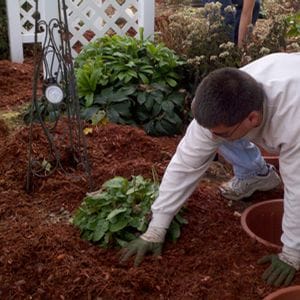Our Average Daily High Temp for November is 45°F
 November isn’t a busy month in the garden, but use the occasional nice days to finish up tasks that you may have put off.
November isn’t a busy month in the garden, but use the occasional nice days to finish up tasks that you may have put off.
You can still get some of those spring bulbs in the ground before it freezes. Lilies should be in by now, but things like tulips, crocus, and daffodils will be just fine. Many stores have specials on them now, so stock up and get planting! You’ll be glad you made the effort when spring arrives!
Continue with fall clean-up. Keep adding to the compost pile and stirring it occasionally. Add water if it seems to be drying out.
If you’ve grown rosemary in your garden, try digging it up by the first of the month and bringing it in for the winter. It won’t survive our cold winters anyway, so why not try it in a south window? The fragrance is nice and you’ll have fresh rosemary to use in cooking, right at your fingertips!
Once the top of the ground freezes, you can mulch around your perennials and shrubs. A layer of two to three inches will help keep them cozy and help moderate freezing and thawing effects.
If you have conifers, use the needles lying on the ground as mulch around some of your plants, especially the ones that like acidic conditions. Azaleas, rhododendrons, magnolias, and blueberries are just a few of the plants that will benefit from pine straw mulching. In the spring, work it into the ground around your plants, if possible.
Drain water hoses before they freeze. Disconnect them from the spigot and store them inside, if possible.
The first of the month is the time to pot up amaryllis bulbs for Christmas blooming. Most bulbs come into flower in six to eight weeks from the time of planting. Make sure you leave the top third of the bulb exposed and only lightly water until you see signs of growth. Don’t keep the potting medium soaking wet as the plant grows, or you may experience bulb rot. Let it dry out almost completely before watering again.
Inspect house plants for any signs of pests such as white fly or aphids. If you find them, rinse plants in the shower every few days. If this doesn’t take care of them, use an organic insecticide such as Neem oil or other insecticidal soap spray. If you see mealy bugs on your houseplants, these can be hand-picked off. Orchids are especially susceptible to them and may have been inadvertently brought in when the plant was purchased. Be sure to inspect crevices for signs of the white fuzzy pests. A cotton swab dipped in rubbing alcohol is a good way to clean them off leaves and stems.
Rake up apples that have fallen under apple trees and dispose of them. During the winter, these are attractive to deer and other foraging animals that may find other things in your landscape to be tasty.
To-Dos:
- Plant spring-blooming bulbs if the ground isn’t frozen.
- Continue with fall clean-up.
- Stir the compost and water it, if needed.
- Pot up the rosemary for overwintering.
- Mulch garden beds, trees and shrubs, once the top layer of ground has frozen.
- Drain water hoses and store for the winter.
- Pot up amaryllis bulbs for holiday blooms.
- Check house plants for insects and treat accordingly.
- Rake up apples and dispose of them so you don’t invite hungry deer into your yard.
